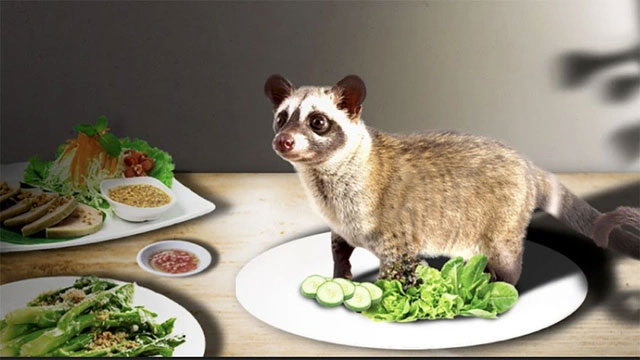Wild animal meat - a lucky or harmful dish?
Many people say that eating wild boar, mink, and lizard meat brings good luck for the new year, but experts warn that they can be harmful to health. Is this true or false?

Consuming wild animal products poses many health risks. (Illustration).
Dishes made from wild animals such as wild boars, bamboo rats, donkeys, weasels, or reptiles such as monitor lizards, turtles, and wild birds, are considered by many Vietnamese as specialties , "rich people's dishes", Showing luxury when receiving guests. They believe that eating wild animal meat at the beginning of the year will help bring luck and fortune, so the demand for these specialties increases during Tet.
However, consuming dishes from wild animals has many potential health risks , especially when eaters do not know the origin of this specialty. In fact, some dangerous pathogens still appear in wild animals and have the ability to cause disease in humans, such as the A/H5N1 influenza virus discovered in civet cats.
Wild birds can transmit many dangerous diseases such as H5N1 avian influenza virus, Ornithose disease (bird fever), Psittacose disease (parrot fever), diarrhea, cholera, dysentery, helminths, and Japanese encephalitis virus. .
On the other hand, many people mistakenly think that wild animals, typically wild boars, originate from nature so they are "clean" and can be processed into blood pudding and consumed. However, eating wild boar blood pudding still carries the potential risk of contracting swine streptococcus. Patients infected with swine streptococcus get worse very quickly. Just a few hours after symptoms of stomach pain, nausea, vomiting or rashes appear on the body, the symptoms become severe.
In addition, if wild boar or other wild animals such as civets, muntjacs, and bamboos are not cooked, there is a potential risk of infection with helminths, leading to dangerous complications.
Doctor Le Van Thieu,
Department of General Infections, Central Tropical Diseases Hospital
- Bad trick, the bloodiest dish of Chinese people
- 3 types of red meat contain toxins that cause cancer type 1 best not to eat
- Find out how to make meat from the lab without slaughtering animals
- The earth is being destroyed because humans eat a lot of meat
- By 2040, too many meat products are not of animal origin
- Why are ostrich meat red?
- Meat, fish 'suck' chemicals: how harmful?
- If you don't eat meat, what will people do?
- There is an opportunity to 'enjoy' artificial meat
- Why can stir fry a dish that can be harmful to health?
- Why often lucky money sheets 2 USD in Tet?
- The world's first artificial fried meatballs
 Soaking vegetables in salt water does not remove chemicals but you should still do it
Soaking vegetables in salt water does not remove chemicals but you should still do it You should limit bamboo shoots if you have 1 in 5 of these diseases
You should limit bamboo shoots if you have 1 in 5 of these diseases Mistakes when soaking vegetables in salt water
Mistakes when soaking vegetables in salt water Risk of death when combining shrimp with vitamin C
Risk of death when combining shrimp with vitamin C